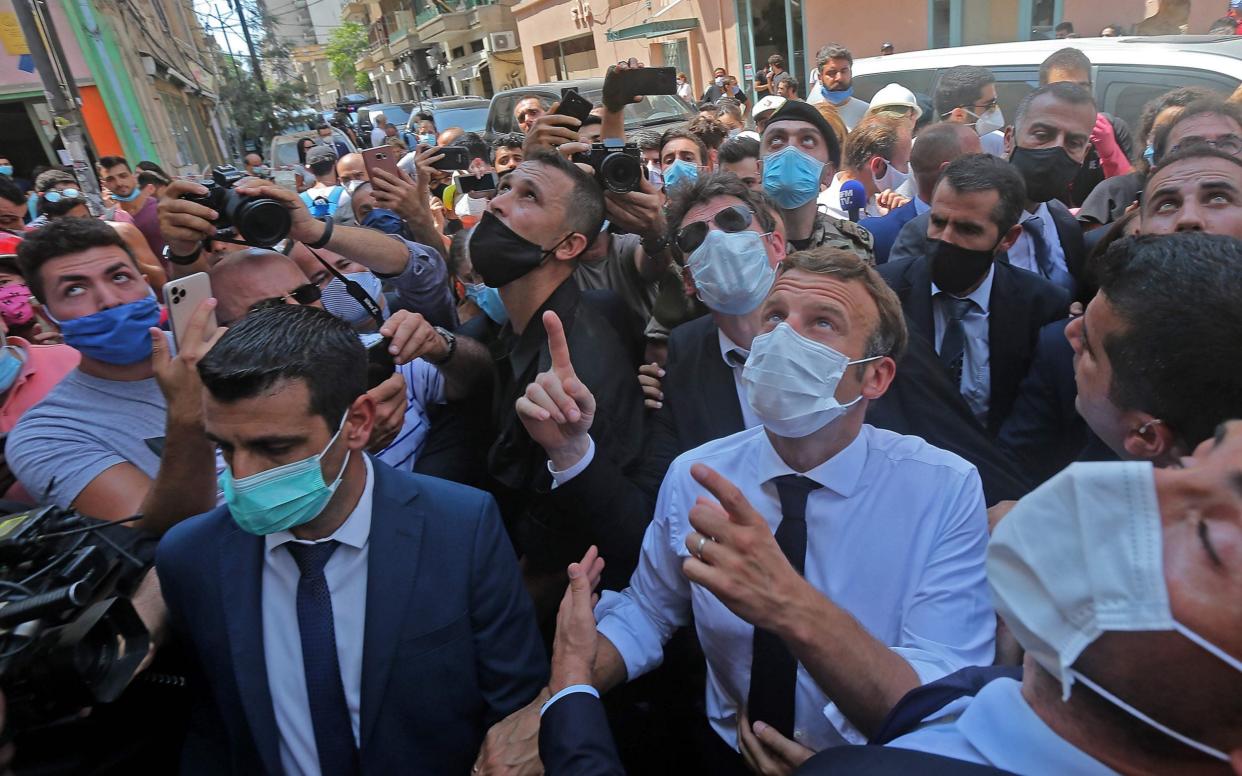Beirut explosion: Angry Lebanese mob Emmanuel Macron demanding 'revolution' against their leader

Angry Lebanese mobbed French President Emmanuel Macron in Beirut on Thursday, demanding his help in overthrowing their reviled leaders, as outrage grew over a devastating explosion caused by thousands of tons of dangerous chemicals that were stored in the capital for years despite repeated warnings.
The visiting French leader warned that without structural reform the country would "continue to sink", as the death toll rose to 145 and over 5,000 injured by the port blast that damaged half of Beirut, the capital of a country already facing economic collapse.
Touring a heavily damaged Beirut neighbourhood, Mr Macron was met by an angry crowd chanting "Revolution" and "The people want to bring down the regime," slogans used during nationwide protests last year.
Surrounded by traumatised demonstrators pleading for help, Mr Macron pushed past bodyguards to hug a woman, something no Lebanese leader has done since the disaster on Tuesday.
"Don't give money to our government, we don’t trust them," one woman called to the French leader.
Mr Macron said he would ask Lebanon's leaders to accept "a new political deal" and "to change the system, to stop the division of Lebanon, to fight against corruption".
He said he was not there to endorse the "regime" and vowed that French aid would not fall into the "corrupt hands”.
As foreign governments consider aid for Lebanon -- including the UK which has pledged £5 million -- some Lebanese are demanding it not be channeled through their own government, who they blame not just for Tuesday’s explosion but for decades of corruption and mismanagement.
A British military team was expected to arrive in Beirut on Thursday to help coordinate the British response but the Lebanese government reportedly turned down an offered search and rescue team, saying it had sufficient capacity already.
Since the blast, Beirut streets have been filled with civilian volunteers sweeping up rubble and broken glass but precious few government workers. “Why do we have more Palestinian civil defence workers helping us out than the government?” one man asked. “We have more Syrian refugees helping us than the government.”
“Not a single dime should go to this government,” said Fady, a Beirut resident whose home was destroyed in the explosion. “They have no competence to respond to anything.”
“All they’re good for is to beg for money from foreign governments so they can steal it and splurge it on their castles and fancy weddings,” he said, withholding his surname because of his job with an international aid organisation.
In this climate, foreign aid to the government may be interpreted as an endorsement of a political oligarchy that for decades has pillaged Lebanon an endless cycle of graft and dysfunction.
“The international community is partially responsible because they’ve supported these same warlords for the past 20 years because they didn’t want to see the country return to the civil war,” Fady said. “I’d rather go back to a civil war than to live with these inhuman warlords in power.”
No Lebanese leader has yet resigned over the disaster, even as officials acknowledged that despite repeated warnings from port authorities, an estimated 2,750 tons of ammonium nitrate had been left in a warehouse in the port since it was seized in 2014.
Lebanese President Michel Aoun has promised accountability, while Prime Minister Hassan Diab has vowed “those responsible will pay the price for this disaster.”
Many skeptical Lebanese believe that promises of justice are more likely to result in scapegoating though, and are demanding that heads roll now, with the Arabic hashtag “Prepare the nooses” trending on Twitter.
Already, leaders have begun deflecting.
"It's not my job to know," Public Works Minister Michel Najjar told Al Jazeera when asked about dangerous materials stored at the port.
Claiming his ministry had repeatedly warned of the danger posed by the stored ammonium nitrate, he blamed the courts. "The judiciary didn't do anything," he said. "It's negligence."
Amid the blame-shifting, Prime Minister Hassan Diab is leading an investigation committee staffed by ministers and the heads of the country’s security agencies.
But few have faith in the government to investigate itself. Amnesty International has called for an international mechanism to probe the disaster “free from any potential domestic political interference”.
“The Lebanese state and judiciary has an abysmal record when it comes to investigating incidents like these and that’s in large part because they’re the criminals themselves,” said Anthony Elghossain, a Lebanese American lawyer.
“Lebanese leaders have killed a country, buried it and pissed on its grave,” he said. “That’s what people are feeling right now. For 30 years people have been telling themselves it can’t get much worse but look at it now… They played hot potato with a megabomb.”


